Lindani Mthembu has survived off the dump for 16 years; his friend joined him when he was retrenched.
A rubbish dump is at the heart of a battle in one of the North West’s most dangerous townships, Sondela, pitting residents who live near the dump against people who mine it for a living.
This follows last year’s announcement by the municipality that it would set aside R500-million to remove the dump and deal with service delivery problems.
The stench of garbage is palpable as you drive past the Bana-Pele Primary School that is only a stone’s throw away from the mountain of rubbish.
There’s bustling life at the dump. Like an ant colony, the system is structured. The pickers are at the top of the dump to rummage through what the trucks leave behind, fill their plastic bags with bottles, metal and cardboard, and drag them down the dump.
At the bottom is the next level of the system – those who sit under ragged canopies made of plastic sheets and operate the pay-by-weight charging system for all types of valuable waste. It is then loaded on to a vehicle that will sell the stock in trade in the town of Rustenburg.
There would be nothing wrong with this if it wasn’t next to a township where residents despise the odours, the dump workers and the system itself.
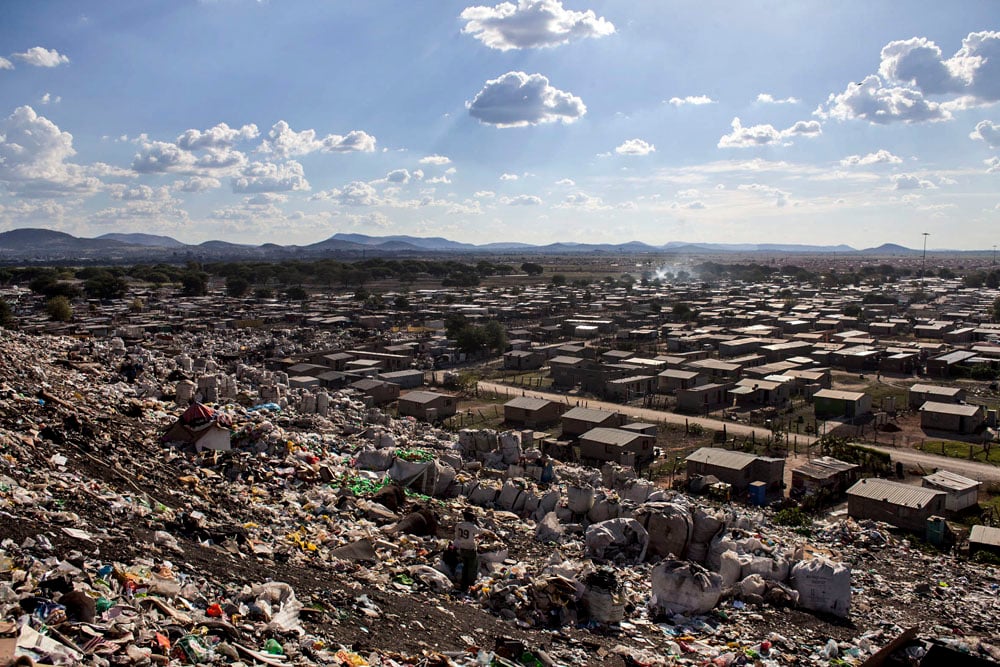
Sondela informal settlement is on the edge of the dump on which the pickers live and find valuable refuse. (Photos: Oupa Nkosi, M&G)
Yet for people like Lindani Mthembu, who has been working on the dump for more than 16 years, this is a way of life, no matter the stench or the horrific items they dig up, such as dead babies and an adult.
“Yes, I have lived a hard life with my parents dying before I could fend for myself. I left school before I turned 13. My relatives didn’t want me, so I had to take care of myself and this place has helped me,” he said.
The pickers can make up to R1 000 a day if they find the right kind of items, such as the steel the mining house right next to the dump used to throw away. But on other days they are not lucky and only earn R60.
“But that is bread for me; that is life for me,” the 29-year-old added. He looks at his friend Lucky Motswaseng, who has only recently joined the business of recycling the dump.
The 24-year-old says he was a cleaner at a mall until about six months ago. “We were retrenched and there was not much I could do, so I came here to dig in the trash and sell what I could find,” he said.
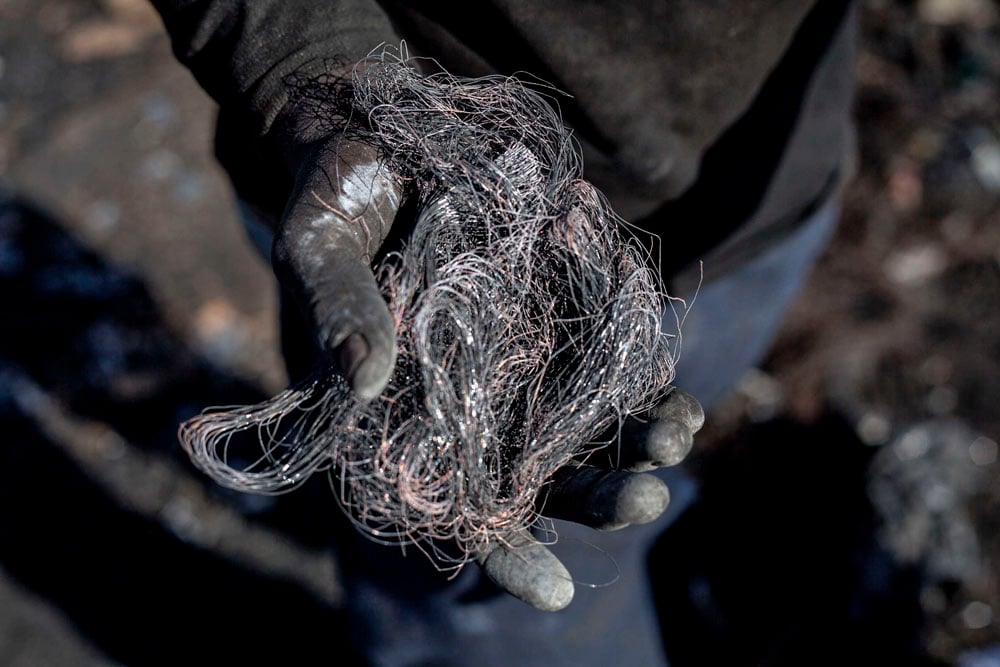
Pickers sell what they find to recyclers to make a living.
Motswaseng says that without the dump people wouldn’t be able to earn a living.
“If this place were to be moved, people would not only starve but they would resort to crime. You know, this place is dangerous already, so what do you think the nyaope addicts will do when they can’t work here to make money and buy that stuff?
“If there is no dump, people must just know that crime will escalate and they won’t be safe,” Motswaseng said.
Many others who spend long hours working on the dump echo his sentiments. Fadzai Mulamo, a mother of three from Mozambique who has lived on the dump for 10 years, said that her role in the system – weighing the pickers’ hauls – can feed her children back home.
“It’s not easy to come to another country and make a life. I started at a dump in Pretoria. I saw that there wasn’t a lot of money there and I heard about this one, and since I arrived here I can make a decent living,” she said.
Some workers live on the dump – they simply step out of their shacks and on to their work premises.
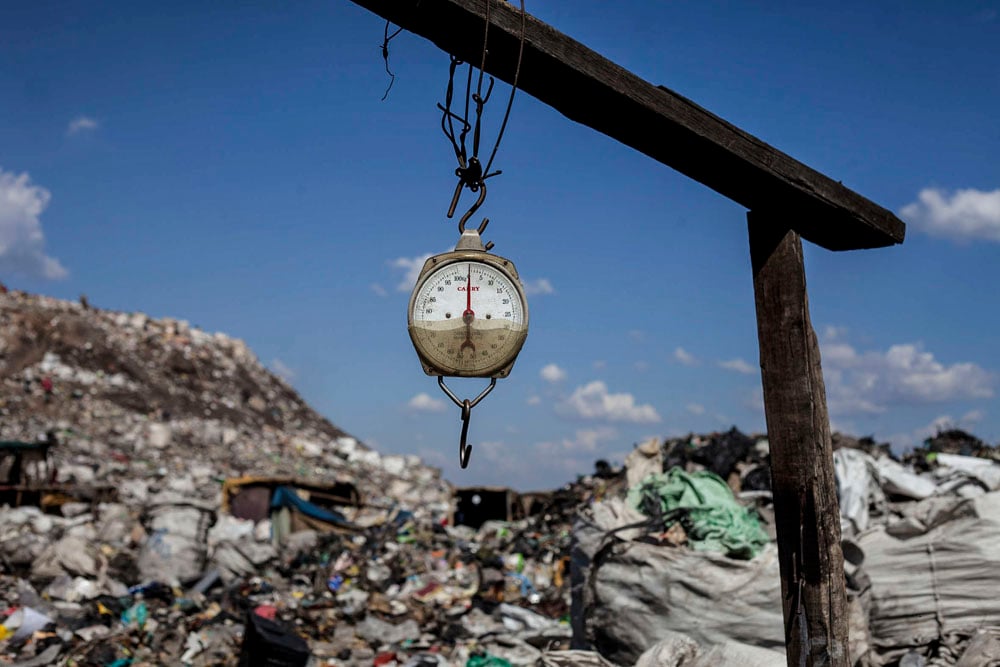
Weighing is one level of the recycling system.
Mohlakwane Motaung from Qwa-Qwa said his shack, which is a few metres from the dump, was perfectly located because he had the advantage of seeing when the trucks carrying the prized garbage were arriving.
Motaung works from morning until he is tired. He is his own boss and is able to send money to his family. Pointing in the direction of the imposingly large mound of rubbish, he speaks of the life it gives.
“The rates for each kilogram have dropped, so we are feeling the pinch – but without this job we would starve.”
He said it was the dump that saved many mine workers who were on the five-month platinum strike in 2014.
“The people who hate this tip and want it gone are probably the same miners who were hungry and without work for months during their strike, and they came here to work so they could eat,” he said.
In spitting distance from the dump are the RDP houses that were built more than 10 years ago, when the mound of refuse was smaller. The residents are angry about the smell and sight of the dump.
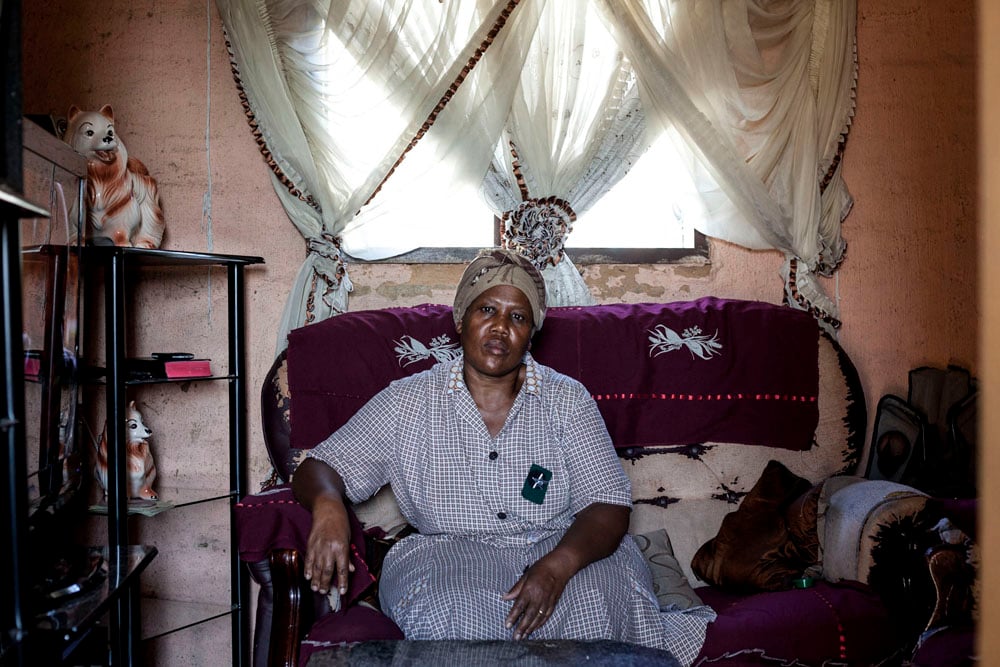
Connie Motsaathebe lives next to the dump and complains of the smell and health risks.
Connie Motsaathebe, whose only view from her four-room home is garbage, says she can’t open her windows.
“There have been so many conversations and meetings about that thing but nothing can be done. Those people even threatened us, saying that if their dump is closed they will come into our houses and steal everything,” said Motsaathebe.
She says she is more worried about possible health implications than confrontations with the dump workers. Her two youngest children, aged 13 and seven, cannot live with her because she is afraid that they will develop respiratory diseases.
“Down the road there’s a young kid who, all of a sudden, couldn’t breathe one day and now she has asthma.
“My eldest daughter, now 18, was admitted [to hospital] three years ago. When I sneeze I can see blood on the handkerchief. This is not the life we should be living.”
A few houses down her street Itumeleng Tladi (39), who is a security guard, said: “There are times when they burn things up there. The smoke gets into our homes, stains everything and we have no way of stopping it.”
He remembers an incident a few weeks ago when a fire started creeping towards their houses. “We called the fire brigade and it took more than three hours to get here. I’m not sure if anyone should be living this kind of life.”
With the dump causing a deep rift, it seems no one knows what the solution should be. The Rustenburg municipality doesn’t appear to have a plan that takes both parties into account; it only promises to throw money at the problem.
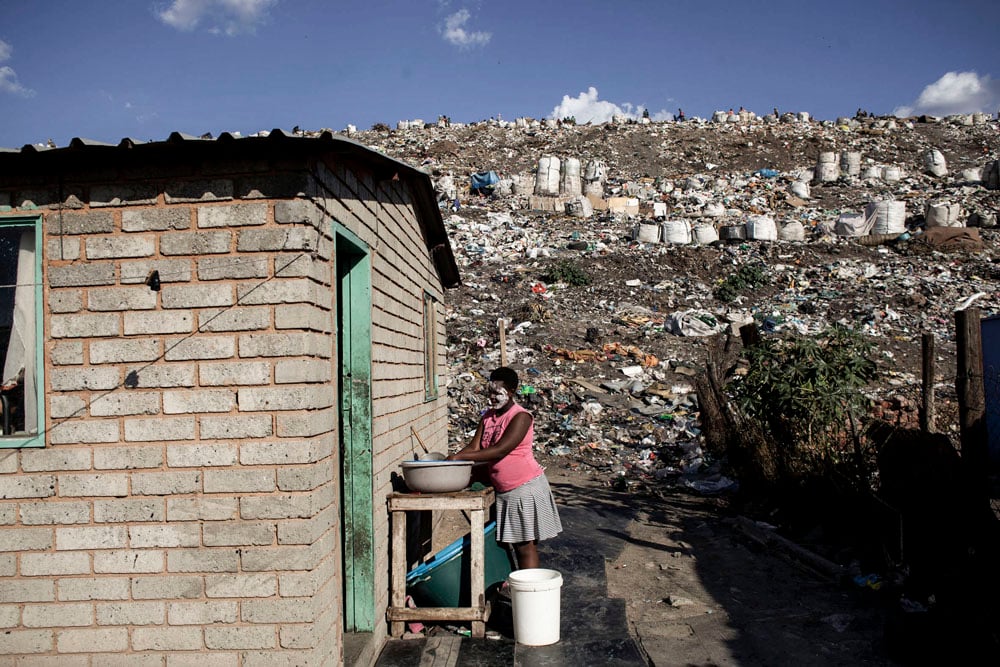
Some Sondela homes are just a few steps from the dump.
Spokesperson Thapelo Matebesi said the municipality was agitated about the dump being so close to the township. “We could not meet the original timeline of the completion of the landfill due to a number of delays attributable to funding shortfalls, which had to be resolved with national government.
“The sheer enormity and complexity of the project also presented a number of unforeseen challenges in terms of project management and construction phase,” Matebesi said.
“Another unforeseen delay arose when a body was found in one of the disused mining shafts. The police were then required to do the necessary investigation prior to resumption of the project.”
He added that in three months’ time the municipality would start work on shutting down the dump for good – but those who work there will not make it an easy task.